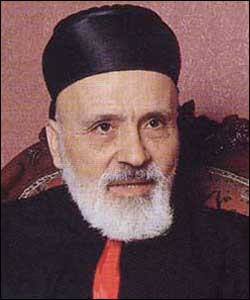 Daily star By Maroun Khoury and Therese Sfeir, BEIRUT: Lebanon’s fragmented political class Thursday seemed able to agree, for the most part, in its support for a "declaration of principles" issued by the Maronite Church. Hizbullah politburo member Hajj Ghaleb Abu Zeinab described the declaration as "positive in its general aspect," but said it contained "a few details that should be discussed." "There are several meeting points between the opposition’s demands and Bkirki’s declaration," Abu Zeinab told the Central News Agency.
Daily star By Maroun Khoury and Therese Sfeir, BEIRUT: Lebanon’s fragmented political class Thursday seemed able to agree, for the most part, in its support for a "declaration of principles" issued by the Maronite Church. Hizbullah politburo member Hajj Ghaleb Abu Zeinab described the declaration as "positive in its general aspect," but said it contained "a few details that should be discussed." "There are several meeting points between the opposition’s demands and Bkirki’s declaration," Abu Zeinab told the Central News Agency.
He said those meeting points included the implementation of "a code of honor" that would apply to all parties, the creation of an international tribunal to try former Premier Rafik Hariri’s killers, a new electoral law, and the formation of a "reconciliation" government that would hold early presidential elections. But while Bkirki said a new electoral law should be based on the qada, "others have different views about the law," Abu Zeinab said. But the Hizbullah official said the presidency was "not a main obstacle that would prevent us from resolving the crisis." For its part, the Reform and Change parliamentary bloc offered its "full support" Thursday to the Church’s declaration, saying it considered the declaration to be "the basis for a comprehensive solution to Lebanon’s current crisis." Speaking after a separate meeting with Sfeir Thursday, former MP Fares Soueid from the March 14 coalition urged the opposition to end a week-long demonstration in the capital and abide by the declaration.
In an interesting turn of events, a statement from the bloc asked the judiciary about the status of official investigations into the assassinations of Industry Minister Pierre Gemayel and MP Gebran Tueni.
The March 14 Forces have repeatedly complained that President Emile Lahoud has refused to forward both cases to the Civil Judicial Council, the body that handles crimes against the state.
MP Ibrahim Kenaan, a member of the bloc headed by MP Michel Aoun, met with Maronite Patriarch Nasrallah Boutros Sfeir on Thursday.
Kenaan said he hoped all political parties would abide by the declaration’s principles and "implement them as soon as possible."
The Church’s declaration "should be taken seriously and should be considered as a pact of accord between all the Lebanese," he added.
Sfeir urged the Lebanese to unify ranks and work for Lebanese interests.
"Nations are not governed by sticks but by dialogue and wisdom," the patriarch told a delegation from the Lebanese Forces Youth Committee in Bkirki.
Sfeir encouraged university students to "avoid political disputes that sometimes lead to fights." Several clashes have taken place at universities across Lebanon in recent weeks over political disagreements.
"We are required, in light of this crisis, to unify ranks in order to save our country and overcome lurking threats," he added.
Speaking after a separate meeting with Sfeir Thursday, former MP Fares Soueid urged the opposition to end a week-long demonstration in the capital and abide by the declaration.
"The Maronite Church, through this declaration, wanted to achieve unity among all Maronites and Lebanese," he said.
Soueid urged the opposition to voice its support for the tribunal in the Parliament, while expressing his own support for early parliamentary elections.
Social Affairs Minister Nayla Mouawad also expressed support for the declaration after meeting with Sfeir Thursday, but said the March 14 Forces would not allow the opposition a "blocking third" in the Cabinet.
Echoing one of the declaration’s suggestions, Mouawad urged Speaker Nabih Berri to convene a parliamentary session to discuss national issues.
Sfeir also met Thursday with Justice Minister Charles Rizk.
Meanwhile, Sheikh Abdel-Amir Qabalan, vice president of the Higher Shiite Council, accused the majority of being at the "core of the current crisis."
During a meeting Thursday with Belgian Ambassador Stephane De Loecker, Qabalan said: "The current crisis is political and not sectarian."
"Demonstrations are national par excellence because they include people from different sectarian and political backgrounds," he added.
Qabalan said all Lebanese should work together to form a national unity government to "resolve all political and socio-economic disputes."
In a separate development, former Prime Minister Salim al-Hoss said Thursday that statements made by Syrian officials about the Lebanese situation were "not reassuring."
Hoss criticized Syrian Vice President Farouk Sharaa’s comments Wednesday from Damascus that "conflicts will continue in Lebanon as long as some parties rely on international tutelage to remain in power."
"Consequently, they won’t be able to build a unified and independent state, and Syria has nothing to do with this problem," Sharaa added. "If Syria wanted to interfere in Lebanon’s affairs, it would have settled the issue of street demonstrations on the first day."
"What does he mean by saying that Syria would have settled the issue?" Hoss asked. "If he meant it would have repressed the demonstrations, we tell him that we live in a democratic country where holding protests is a constitutional right."
The former premier said that should a national unity government be formed, it must "put the international tribunal at the top of the ministerial agenda."



